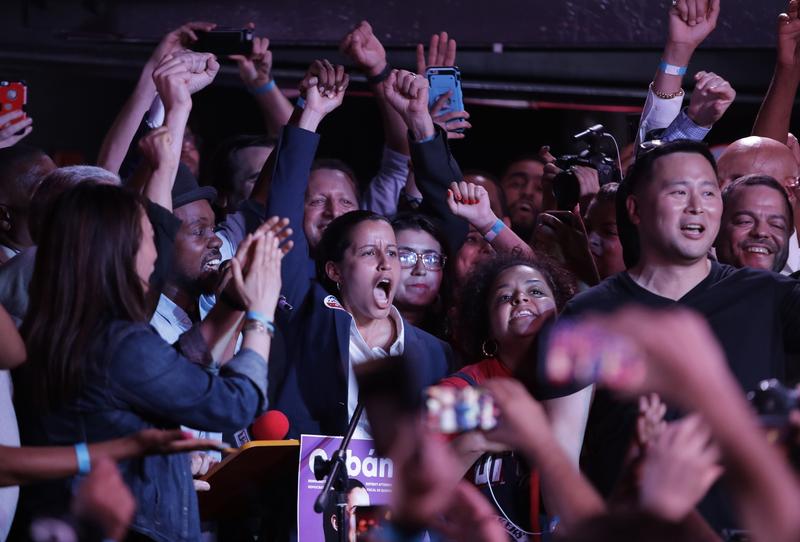
Is Tiffany Cabán the next district attorney of Queens?
It's too early to say, as the votes are still being counted. But her strong primary showing (and likely triumph) against the Democratic establishment's candidate, Melinda Katz, is just the latest in a series of dramatic events in the borough.
Months earlier, a grassroots uprising forced Amazon to abandon its huge development deal in Long Island City.
Before that, a political neophyte, Alexandria Ocasio-Cortez, defeated Rep. Joe Crowley, the leader of the county party committee and one of the most powerful Democrats in the country.
However, the progressive surge arguably goes back even further, to Feb. 3, 2017. That night, temperatures dipped down to 16 degrees Fahrenheit, but hundreds of demonstrators gathered outside the Jewish Center in Jackson Heights for hours to unleash their fury.
The object of their anger was State Sen. Jose Peralta, who had quietly joined the Independent Democratic Conference, a group of Democrats who often voted with Republicans in the state legislature.
After Donald Trump's election, with area residents under constant threat of deportation, this was no longer tenable. Peralta (who died in November 2018) was defeated by community organizer and city official Jessica Ramos.
That surprise defeat and others have helped redefine the borough of 2.4 million. Previously known to outsiders as Brooklyn's more-diverse, less-hip neighbor, a vast landscape of ethnic eateries, Queens has emerged as the capitol of the nation's progressive movement.
However Ramos, now the state senator representing Jackson Heights, Corona and East Elmhurst, traced the origins of this movement even further back, to the days of Occupy Wall Street in 2011. At the time, she said Occupiers in Queens came together at the same Jewish Center where Peralta would one day face his detractors, in Jackson Heights.
"And it was folks from all walks of life, from every corner of the planet, who really were feeling, already, that change needed to come," said Ramos, who is Colombian-American. "That there was really no reason to malign us for being people of color, for being gay, for being an immigrant, for being a person with a disability. And we managed to create a progressive agenda."
This agenda was rooted in the belief that government should help bring about a more equitable society.
That idea motivated the fight against Amazon's heavily-subsidized move into Long Island City. Ramos said many of those activists moved on to support Cabán. And then Ocasio-Cortez endorsed Cabán (before Bernie Sanders and Elizabeth Warren did the same), and the money started coming in.
"Before that, it was really shoestring," recalled Nuala O'Doherty, the policy director at Amplify Her and a volunteer on the Ocasio-Cortez, Ramos and Cabán campaigns. "There was no money."
The donations helped the campaign invest in t-shirts for its growing army of volunteers, said O'Doherty, as well as flyers in different languages: not just English and Spanish, but Chinese and Korean, Bengali and French Creole.
"What really impacted my wife and me was to see how many South Asian families whose doors we knocked [on] who told us, 'We already voted and we voted for Tiffany,'" said Shekar Krishnan, a tenants rights attorney who helped get the vote out for Cabán on the day of the primary.
This was the antithesis of ethnic tribalism: Bangladeshi Muslims voting for a self-described queer, Latinx candidate, even though there was also a South Asian candidate on the ballot, prosecutor Mina Malik.
Of course, not all people of color voted for Cabán. Middle-class black neighborhoods in Southeast Queens, for instance, went for Melinda Katz. Still, how did Queens of all places become the capital of Blue America?
Shannon Stagman, an organizer of the progressive group Empire State Indivisible, has a theory: Queens is defined by newcomers, and they are collectively reconciling the ground reality of this nation with the promise of it.
"They haven't felt for a long time that the politicians who run their borough are speaking to them," said Stagman.
"What we're seeing in the last year are these new candidates who recognize that, who share those identities and share those experiences with them. And that is a revelation to people who have really felt unseen and unheard in Queens."
And what's happening in Queens is being closely observed by Democratic operatives across the country.
"I think it's hugely significant," said Mike Lux, who worked in the Clinton White House and is president of American Family Voices, in Washington, D.C.
"The question now is, does this new progressive upsurge and these new progressive leaders coming out of places like New York City, do they then translate to the rest of the country?"
With the 2020 presidential campaign now ramping up, we're about to find out.
CORRECTION: An earlier version of this story incorrectly stated the date of the rally against José Peralta. Updated 12:30 p.m., June 28, 2019.
